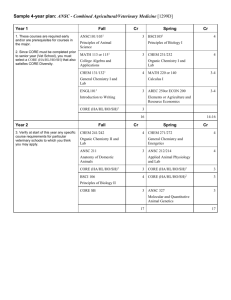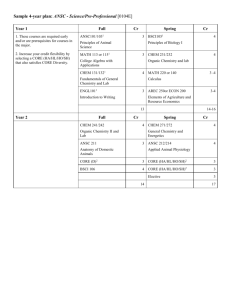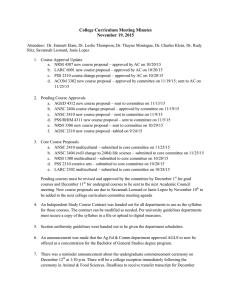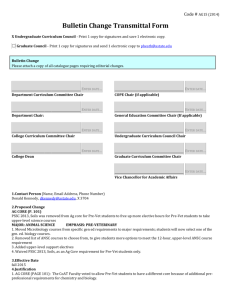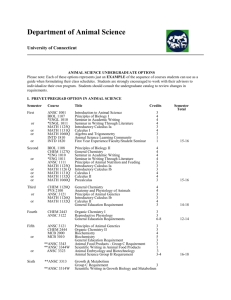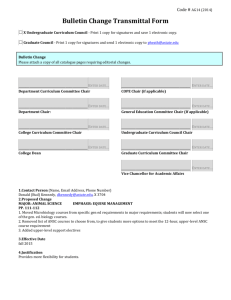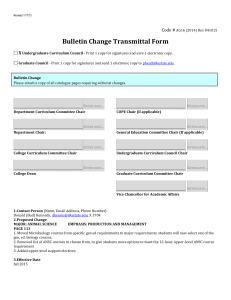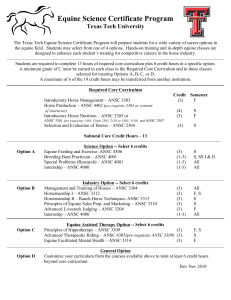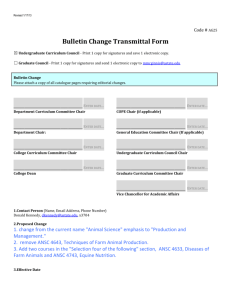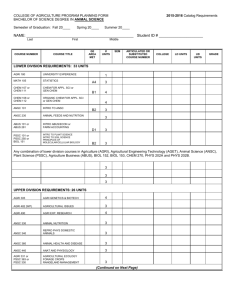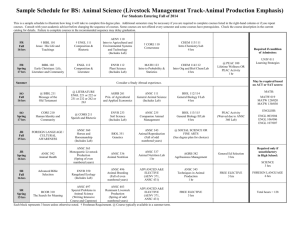Engaging Students in Authentic Research in the Classroom
advertisement
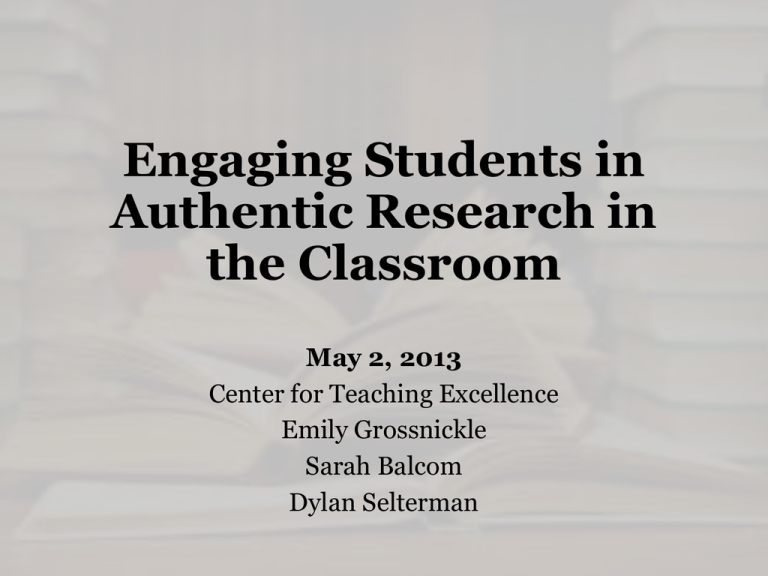
Engaging Students in Authentic Research in the Classroom May 2, 2013 Center for Teaching Excellence Emily Grossnickle Sarah Balcom Dylan Selterman What is Research? “Process of creating new knowledge --Maryland Center for Undergraduate Research Compare to what Davis & Shade (2000) refer to as Apprentice Work: “Not making knowledge as much as reporting the known” Searching for information in libraries and archives Conducting fieldwork Theory testing Communicating results Creating models What is Research? Performing computations Composing creative works Surveying and interviewing subjects Ways in which students can engage with research 1. Research-led: Learn about current research 2. Research-tutored: Engage in discussions about research 3. Research-oriented: Develop skills and techniques 4. Research-based: Undertake research --Jenkins and Healy (2000) Why engage your students in research and what might be stopping you? Goals for your students Potential Barriers Knowledge goals Instructor/Instructional Critical thinking goals Student/Learning Motivational goals Pragmatic Other Other Maryland Center for Undergraduate Research www.ugresearch.umd.edu 2100D McKeldin Library Undergraduate research day Database of projects Resources for faculty and students RESEARCH IN THE CLASSROOM: EXAMPLES FROM MY ANSC COURSES Sarah Balcom, DVM, MS Animal and Avian Sciences 2 May 2013 WHY I TEACH RESEARCH IN THE CLASSROOM Students don’t understand how to do it Students don’t evaluate existing research well It engages students It develops skills for life-long learners THE RESEARCH PROCESS Encounter a phenomenon that cannot yet be explained Generate specific questions Discover what is already known Share the results -Papers -Posters -Oral presentations Evaluate prior research Formulate a new area of inquiry/hypothesis Evaluate results Conduct an experiment Consider design and execution 1. LEARNING TO SEARCH THE MEDICAL AND SCIENTIFIC LITERATURE Asking the right questions Generating good search terms Using academic search engines Sorting results 1. LEARNING TO SEARCH THE MEDICAL AND SCIENTIFIC LITERATURE Ex. ANSC 275- Introduction to Veterinary Medical Science and Practice Case discussion: Heartworm disease in dogs Concept: Is it a good idea to keep dogs on year round heartworm preventative? Pros: Compliance, control of GI parasites, income for vet Cons: Cost to owner, possibility of the worms evolving resistance to the dewormer Research question: Is resistance to dewormers a problem with canine heartworm disease? 2. FIELD METHODS IN CLASS Skills learned Data collection appropriate to the discipline Not everything goes as planned Revising and refining until you know how you need to make your observations, collect your data, run your experiment, etc. The study design process 2. FIELD METHODS IN CLASS Ex. “Epidemiology in action” class for ANSC 340- Health Management of Animal populations Flipped class: Pre-work about monitoring animal health, making observations, basic epidemiology Students designed means of measuring respiratory disease among UMD students in Feb. 45 minutes (90 min course) to make observations Groups of 5-6 students 6 different locations on campus 30 minutes to discuss what worked what didn’t work results 2. FIELD METHODS IN CLASS 2. FIELD METHODS IN CLASS Discussion of data and its collection, what to do with results Refine ideas on data collection incorporated into animal disease surveillance plan (final project component) another level on which to judge epidemiology studies 3. ARTICLE CRITIQUES Skills learned Evaluation of authorship, content, format and style, applicability of articles Critical thinking Writing 3. ARTICLE CRITIQUES Ex. ANSC 250- Companion Animal Care and Management Groups evaluate a scientific or medical article using a set of guided questions Discussion of some of the major points that came out in the critiques Study design Funding sources Assumptions, biases, and other pitfalls Usefulness of different types of resources for different groups of people involved with comp aml care 3. ARTICLE CRITIQUES Basis for selecting references for take-home final exam scenarios Same process used to evaluate our guest speakers as well 4. CONDUCTING A MINI-RESEARCH PROJECT Ex. ANSC 225- Love me, Hate me, Use me, Save me: Our conflicting views of animals. Some students interested in conducting a short study Ethnographic interviews and participant observations Coding for themes uncovered in the interviews Guidance from me in design, execution, and analysis of the research 4. CONDUCTING A MINI-RESEARCH PROJECT Example: Why does hitting an animal on the side of the road bother some people and not bother others? Study sample Question guide Analysis CONCLUSIONS It’s a lot of fun. It certainly beats lecturing! It takes planning. Many students enjoy it. Research in Undergraduate Education Dylan Selterman, Ph.D. Department of Psychology Courses & Format/Goals PSYC 221 – Social Psychology (S in P) Large; blended; content + scholarly activities PSYC 334 – Interpersonal Relationships Large; upper-level; content PSYC 420 – Social Psych Research Lab Small; upper-level; student-led research Psychology lab (420) Semester-long project 2-hr lab sections run by TAs (2 hr lecture) Emphasis on replication Eases burden on students & teachers Plus extension (new variable) Content (broad) VS. Application (specific) Focus on 1-2 key concepts to apply 1-3 sub-disciplines (faculty expertise) Unlike graduate methods/stats courses Issues & Concerns Time Resources (Qualtrics; Facebook) Class size Student ideas can be poor Most research fails Repeating content from previous courses Students struggle to communicate ideas Strategies in other courses Scientific creativity & innovation Focus on pieces of the research process Literature review; summary of findings Scale creation (measures, items) Discuss/debate, communicate findings Propose new theories (MFT) & hypotheses Propose new methods/studies Peer review Scientific writing (APA style) Popular media writing Science of Relationships; In-Mind Magazine Issues & Concerns Little previous education in the field Emphasis on the basics Pushback from students Difficulty & motivation Need strong TA support (GTA & UTA) Devote class time and extended office hours for Q&A
